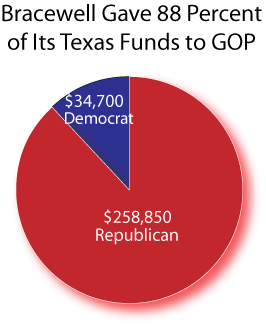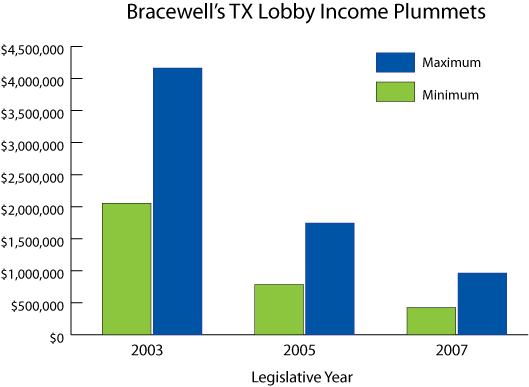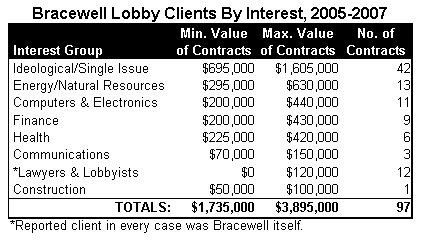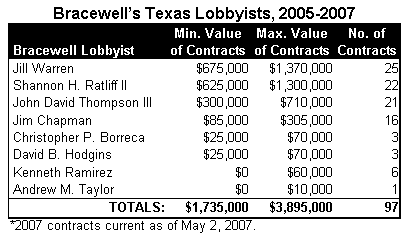It's Business As Usual In Texas
For Rudy Giuliani's Bracewell
| S |
|
ince it named ex-New York Mayor Rudy Giuliani as its new name partner in March 2005, Houston’s well-connected Bracewell & Giuliani appears to have changed little.
Bracewell & Giuliani continues to run revolving-door lobby practices in Washington and Austin. It still doles out hundreds of thousands of dollars to predominately GOP candidates for state and federal offices. These donations include tens of thousands of dollars to Texas judges who routinely decide Bracewell-litigated cases.
Even Giuliani’s campaign stint with the firm has recent precedents in Texas, where Bracewell previously has provided jobs for campaigning politicians. In the 2002 election cycle, for example, it put Greg Abbott on its payroll when he stepped down from the Texas Supreme Court to run for state attorney general. For Giuliani, the firm provides an entrée into Texas fundraising. The $2.2 million that Texans gave Giuliani in the first quarter of this year exceeded what they gave to any other GOP presidential candidate.
Top Recipients of B&G Contributions
(April 2005-Dec. 2006)
Amount |
Candidate | Party |
Office Held/Sought |
$25,000 |
David Dewhurst | R |
Lt. Governor |
$22,100 |
Greg Abbott | R |
Attorney General |
$20,000 |
Rick Perry | R |
Governor |
$15,000 |
Susan Combs | R |
Comptroller |
$15,000 |
Don Willett | R |
Supreme Court |
$10,000 |
Phil Johnson | R |
Supreme Court |
$7,500 |
Tom Craddick | R |
Speaker |
$5,000 |
Nathan Hecht | R |
Supreme Court |
$5,000 |
Wallace Jefferson | R |
Supreme Court |
$5,000 |
Elizabeth A. Jones | R |
Railroad Com. |
$5,000 |
David M. Medina | R |
Supreme Court |
$4,000 |
John Whitmire | D |
Senate-15 |
$3,000 |
Elsa Alcala | R |
Appeals Court-1 |
$3,000 |
Dianne Delisi | R |
House-55 |
$3,000 |
Lois Kolkhorst | R |
House-13 |
$2,500 |
William Burke | R |
Dist. Judge-189 |
$2,500 |
Steve Ogden | R |
Senate-189 |
$2,500 |
Todd Staples | R |
Agriculture Com. |
$2,250 |
James Keffer | R |
House-60 |
$2,000 |
John Anderson | R |
Appeals Court-14 |
$2,000 |
Kip Averitt | R |
Senate-22 |
$2,000 |
Kim Brimer | R |
Senate-10 |
$2,000 |
Jeff Brown | R |
Dist. Judge-55 |
$2,000 |
John Carona | R |
Senate-16 |
$2,000 |
Bob Deuell | R |
Senate-2 |
$2,000 |
Robert L. Duncan | R |
Senate-28 |
$2,000 |
Kevin P. Eltife | R |
Senate-1 |
$2,000 |
Troy Fraser | R |
enate-24 |
$2,000 |
Charlie Geren | R |
House-99 |
$2,000 |
*Catharina Haynes | R |
Dist. Judge-191 |
$2,000 |
Kyle Janek | R |
Senate-17 |
$2,000 |
Phil King | R |
House-61 |
$2,000 |
Mike Krusee | R |
House-52 |
$2,000 |
Jane Nelson | R |
Senate-12 |
$2,000 |
Jim Pitts | R |
House-10 |
$2,000 |
Royce West | D |
Senate-23 |
$2,000 |
Tommy Williams | R |
Senate-4 |
$1,500 |
Dennis Bonnen | R |
House-25 |
$1,500 |
Norma Chavez | D |
House-76 |
$1,500 |
Rodney Ellis | D |
Senate-13 |
$1,500 |
Scott Hochberg | D |
House-137 |
$1,500 |
David Puryear | R |
Appeals Court-3 |
$1,500 |
David Swinford | R |
House-87 |
$1,250 |
Rafael Anchia | D |
House-103 |

Bracewell PACs
From the time Bracewell recruited Giuliani to the end of the 2006 election cycle the firm’s state PAC contributed $293,550 to Texas state candidates.1 The firm gave 88 percent of this money to Republicans and the remaining 12 percent to Democrats. During the 2006 election cycle Bracewell’s federal PAC doled out $246,122, according to the Washington-based Center for Responsive Politics, giving 61 percent to Republicans and 39 percent to Democrats.
Bracewell’s state PAC distributed its funds relatively equally among candidates for different branches of state government. It gave a third of its funds to statewide candidates, led by three top GOP officeholders: Lieutenant Governor David Dewhurst ($25,000), Attorney General Greg Abbott ($22,100) and Governor Rick Perry ($20,000).
The firm gave 40 percent of its funds to legislative candidates, led by Tom Craddick ($7,500), who became House Speaker in 2003 with aid from Tom DeLay’s now-indicted Texans for a Republican Majority PAC (TRMPAC). Bracewell’s next-favorite lawmaker was Sen. John Whitmire (D-Houston), who doubles as a Locke Liddell & Sapp lobbyist.2 Whitmire was the first Democratic Senator to return from New Mexico exile in 2003—thereby restoring a quorum to act on DeLay’s congressional redistricting plan.
Bracewell also favored GOP Reps. Dianne Delisi of Temple and Lois Kolkhorst of Brenham. Delisi sat on the TRMPAC’s advisory board and raised corporate money for the PAC. The Hammer summoned GOP lawmakers to Delisi’s office to make the pitch for his redistricting plan in 2003.
Judicial activism
Bracewell gave the remaining 29 percent of its funds to state judicial candidates. Texas judges win office in partisan campaigns. This system is controversial because the judges typically get major shares of their campaign money from lawyers and litigants with cases before their courts. A 1999 Texas Supreme Court poll found that 83 percent of Texans say that state judges are influenced by these campaign donations.
| State Office | Amount |
Percent |
| Legislature | $116,500 |
40% |
| Statewide (non-judicial) | $92,600 |
32% |
| Judicial | $84,450 |
29% |
| TOTALS: | $293,550 |
100% |
Bracewell contributed $40,000 in the 2006 cycle to the five members of Texas’ all-Republican Supreme Court who faced election last year. Meanwhile Bracewell lawyers litigated major cases before this court’s justices, who spent the firm’s money to get elected.
The most sweeping Texas lawsuit in recent years alleged that Texas’ school-finance system amounted to an unconstitutional state property tax. Bracewell represented the plaintiffs,3 a group of property-rich school districts that challenged state “Robin Hood” rules, which diverted some of their revenue to poor schools. Repeatedly upheld by the Texas Supreme Court, this challenge prompted the legislature to overhaul the school-finance system last year.
While this overhaul was overdue, this litigation illustrates the incestuous nature of Texas judicial politics. Unsuccessfully defending the state’s school-funding system in the case was Attorney General Greg Abbott, whom Bracewell financed both personally and politically during his 2002 attorney general campaign. During the case Bracewell attorneys repeatedly squared off against Abbott in front of Abbott’s old colleagues on the high court—who spend Bracewell funds to get elected to that office.
Another Bracewell case before the high court is extremely controversial in business-insurance circles. ARCO sued Bracewell client Frank’s Casing for making an offshore oil rig that collapsed soon after installation. Arguing that the defendant lacked coverage for this mishap, Frank’s insurers nonetheless settled the $7 million claim and then sued Frank’s Casing to recover this money from its own client (Excess Underwriters v. Frank's Casing).
Shortly after a state district judge ruled for the insurers in the ensuing lawsuit the Texas Supreme Court—including Justice Abbott—ruled in a separate case that insurers disputing coverage cannot recover settlement payments from policyholders.4 This prompted the trial court in Excess Underwriters v. Frank's Casing to reverse itself and enter a judgment for Frank’s Casing. Citing the new high court ruling, the intermediate appeals court reluctantly concurred in a 2002 opinion written by Justice Scott Brister—who joined the Supreme Court the following year.
When the insurers appealed to the Texas Supreme Court,5 Bracewell lawyers represented Frank’s Casing. These included Abbott, who had recently resigned from that court to run for attorney general. This time the high court ruled in 2005 that insurers disputing coverage can recover settlement payments from policyholders. The conflicting decisions baffled insurance attorneys and prompted Bracewell and Frank’s to ask the high court for a rehearing.6 Last year the court agreed. Its new opinion in this wild case is pending.
The Bracewell Lobby
Bracewell’s Texas lobby business has been plummeting in recent years. This trend predated Giuliani and appears to be continuing since he joined the firm in 2005. Texas lobby expenditures tend to peak in the odd-numbered years when the state legislature meets in regular session. The accompanying graph shows the minimum and maximum values of Bracewell lobby contracts for the past three legislative years (Texas lobbyists report contract values in ranges, such as $100,000 to $150,000).
From 2003 to 2005 (when Giuliani joined the firm), Bracewell’s Texas lobby revenue fell by approximately 50 percent. The firm’s lobby revenue fell another 50 percent or so from 2005 to early May 2007. While the firm still has most of 2007 to pick up additional clients, the lobby frenzy will dissipate after the legislative session ends later this month. Bracewell’s decline is significant given that the Texas lobby as a whole is a fast-growth industry. From 2003 to 2005, for example overall state lobby revenues increased 10 percent.


Despite this decline, eight Bracewell lobbyists have reported 97 Texas lobby contracts worth between $1.7 million and $3.9 million since 2005, when Giuliani joined the firm. The largest cluster of Bracewell lobby clients are classified in the accompanying chart as “Single-Issue” interests. All of Bracewell’s clients in this sector are local government entities, such as municipalities or school boards, or are associations that represent these interests.
The top lobby issue for school districts has been the legislative fight over how to comply with the aforementioned court order that required the state to revamp school funding. Cities have opposed legislation to contain local property taxes.
When the Texas Legislature balked at one school-funding package in 2005, the state’s GOP leaders blamed it on the “education lobby,” or the school educators and administrators that opposed the plan.7 Taking up the cry, the corporate-friendly Americans for Prosperity has criticized such expenditures of tax dollars on lobbyists. Bracewell lobbyists are major recipients of tax dollars from school districts and local governments. The firm’s education point man is John David Thompson III, who previously held leadership positions at the Texas Association of School Boards and the Texas Education Agency.
Bracewell also helped the school district in Lake Travis near Austin file its unusual harassment lawsuit last year against two parents. Defendants David and Melinda Lovelace reportedly inundated that district with more than 2,000 requests for school financial information under Texas’ Public Information Act.8
 Bracewell’s next-largest client bloc is in the Energy & Natural Resources sector, led by Citgo Petroleum. As Bloomberg LLP reported in March, this Bracewell client is part of the state-owned oil company under Venezuelan President Hugo Chavez—a leading critic of President George W. Bush. Bracewell reported Citgo as a client less than a month after Giuliani joined the firm. Bracewell Managing Partner Patrick Oxford, an elite Bush fundraiser who now chairs Giuliani’s national campaign committee, told Bloomberg that Giuliani had no dealings with Citgo.
Bracewell’s next-largest client bloc is in the Energy & Natural Resources sector, led by Citgo Petroleum. As Bloomberg LLP reported in March, this Bracewell client is part of the state-owned oil company under Venezuelan President Hugo Chavez—a leading critic of President George W. Bush. Bracewell reported Citgo as a client less than a month after Giuliani joined the firm. Bracewell Managing Partner Patrick Oxford, an elite Bush fundraiser who now chairs Giuliani’s national campaign committee, told Bloomberg that Giuliani had no dealings with Citgo.
The firm’s No. 2 energy client, Cap Rock Energy, has some notoriety in Texas. In 1999 precursor Cap Rock Electric Cooperative, hired Christi Craddick, daughter of powerful state Rep. Tom Craddick (R-Midland), as its lobbyist. The company needed lobby stroke as it sought to become the only co-op to convert to an investor-owned utility without losing the perks that coops received under Texas’ 1999 electric deregulation.
Rep. Craddick (who became House Speaker after Texas’ controversial 2002 elections) inserted the magic words into the deregulation bill. Crediting the Craddick family, internal company documents later gloated, “No one gave us any chance of pulling this off, and we feel we did the impossible.”
Bracewell lost one of its top lobbyists late last year, when Jill Warren joined another firm. After running a failed GOP campaign for the House in 2000, Warren worked as an aide to then-Texas Attorney General John Cornyn.
Bracewell’s top-grossing Texas lobbyist is Shannon Ratliff II, the nephew of former GOP Lieutenant Governor Bill Ratliff. Former Texas Democratic Congressman Jim Chapman also lobbies for the firm.
| Bracewell Client | Min. Value of Contracts |
Max. Value of Contracts |
No. of Contracts |
| *City of Carrollton | $235,000 |
$485,000 |
8 |
| *†Corporation for TX Regionalism | $200,000 |
$430,000 |
8 |
| *Cisco Systems, Inc. | $150,000 |
$330,000 |
8 |
| *Wachovia Corp. | $150,000 |
$330,000 |
8 |
| *†CITGO Petroleum Corp. | $150,000 |
$300,000 |
5 |
| Memorial Hermann Hospital System | $125,000 |
$200,000 |
2 |
| Trinity Mother Frances Health System | $100,000 |
$200,000 |
2 |
| *Association of American Publishers | $70,000 |
$150,000 |
3 |
| *Fast Growth School Coalition | $70,000 |
$150,000 |
3 |
| *Houston Independent School Dist. | $70,000 |
$150,000 |
3 |
| Cap Rock Energy Corp. | $75,000 |
$150,000 |
2 |
| *Stafford Municipal School Dist. | $50,000 |
$140,000 |
6 |
| *Bracewell & Giuliani, LLP | $0 |
$120,000 |
12 |
| †Current Communications Group, LLC | $50,000 |
$110,000 |
3 |
| †ORYXE Energy International, Inc. | $50,000 |
$110,000 |
2 |
| Jobe Concrete Products, Inc. | $50,000 |
$100,000 |
1 |
| *†Reserve Management Corp. | $50,000 |
$100,000 |
1 |
| *TX Association of School Administrators | $35,000 |
$95,000 |
4 |
| *TX Council Special Ed. Administrators | $25,000 |
$60,000 |
2 |
| *†King Ranch & King Ranch Minerals | $20,000 |
$50,000 |
2 |
| *Spring Branch Independent School Dist. | $10,000 |
$45,000 |
3 |
| City of Austin | $0 |
$20,000 |
2 |
| †City of Waco | $0 |
$20,000 |
2 |
| TX Medical Center | $0 |
$20,000 |
2 |
| †Gas Processors Association | $0 |
$10,000 |
1 |
| *†Lake Travis Independent School Dist. | $0 |
$10,000 |
1 |
| †Poseidon Resources Co. | $0 |
$10,000 |
1 |
TOTALS: |
$1,735,000 |
$3,895,000 |
97 |
*Current Bracewell client as of May 2, 2007.
†Not a Texas lobby client of Bracewell’s before 2005, when Giuliani joined firm.
1During this period Bracewell & Giuliani’s PAC obtained all of its funds directly from Bracewell & Giuliani LLP.
2 Whitmire lobbies local governments. As a legislator he is legally barred from lobbying state officials.
3 West Orange-Cove Consolidated Independent School District et al.
4 Texas Association of Counties County Government Risk Management Pool v. Matagorda County, 2000.
5 Justice Brister did not participate in the Supreme Court’s review of his appellate decision.
6 “Texas Supreme Court to Rehear Controversial Insurance Case,” Texas Lawyer, January 18, 2006.
7 “School Lobby's Civics Lesson Cost Up To $6.3 Million,” Lobby Watch, Texans For Public Justice, Nov. 30, 2005. The same leaders declined to criticize a single corporation (AT&T) that single-handedly spent even more on Texas lobbyists.
8 Shortly after filing the lawsuit the district recruited Bracewell attorney Susan Bohn to be its general counsel.
Texans for Public Justice. May 17, 2007.
